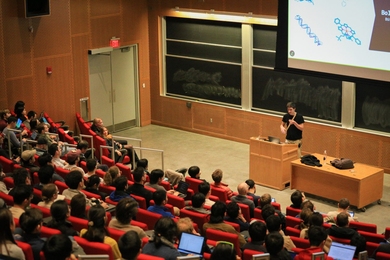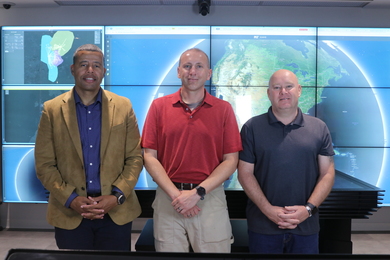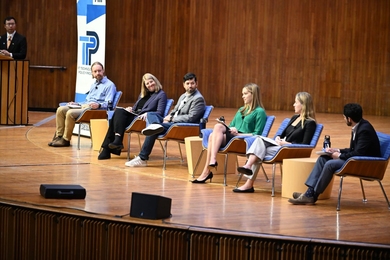An MIT proposal to relocate the CASPAR alcohol and drug rehabilitation shelter from Institute property on Albany Street to 380 Green St., near Central Square, has a December 31 deadline driven by an option-to-purchase held by MIT for the property and due to expire by year's end.
Under the proposal, formally introduced to the Cambridge City Council in August, MIT would buy the land and building at 380 Green St., which is next to the Cambridge police station. MIT would renovate the building to meet requirements of CASPAR's program, and deed the land and building to Cambridge. The city would then enter into a long-term lease with CASPAR (Cambridge and Somerville Program for Alcoholism and Drug Abuse Rehabilitation).
MIT estimates that it would cost about $2 million to acquire and renovate the property. In return, it has asked that the city deed to MIT three streets within the campus-Carleton Street, Hayward Street and the portion of Amherst Street west of Massachusetts Avenue-and the sidewalks of Vassar Street from Massachusetts Avenue to Audrey Street, which runs between Westgate and W91 at the western edge of the campus.
CASPAR and the Cambridge City Manager Robert Healy support the plan. The proposal must be approved by a six-vote majority of the Cambridge City Council.
In material mailed to nearly 2,000 MIT-affiliated Cambridge residents last week, the MIT Office of Government and Community Relations called the proposal a "win-win" situation. The material cited the benefits to CASPAR and the homeless community of a new location that will allow more effective operations of vital services. The solution is made possible through a creative mechanism of a property exchange under which MIT will relieve the city of its responsibilities for maintaining streets and sidewalks largely used by the campus community.
"MIT believes in the importance of the need for the high quality program provided by CASPAR to provide shelter and emergency assistance to Cambridge residents coping with alcoholism and substance abuse," MIT said in a communication signed by Ronald P. Suduiko, assistant to the president for government and community relations, and Sarah E. Gallop, assistant for government relations.
"The most critical outcome of this plan is that CASPAR would finally be situated in a facility which would allow for this outstanding program to continue to provide its vital services to the Cambridge community.
"Since this plan was first announced in August a number of public meetings, coordinated by CASPAR and the City, have taken place to work through the concerns and issues which naturally arise with such a proposal. Cambridge citizens, civic groups and business leaders are also giving careful consideration to the proposed new site. The review includes the appointment of a special committee, chaired by City Councilor Jonathan Myers, which is now meeting weekly to examine all aspects of the 380 Green Street proposal, the siting history and the possibilities of alternative sites."
The communication concluded with an invitation to residents to contact Mr. Suduiko or Sarah Gallop for additional information.
In the most recent of several meetings, about 300 people packed a gymnasium at the Graham and Parks School October 27 to discuss a new location for CASPAR.
A report on the meeting by the Cambridge Chronicle's Bob Rawson said that more than 60 people spoke, 23 in favor of 380 Green St., 32 opposed and 11 who "raised other questions they felt needed answers before the issue could be resolved."
These other questions included whether Central Square was the right location for the shelter and whether MIT's proposal was appropriate for the city.
One speaker, identified in the Chronicle as Harold Goldman of Hancock Street, was quoted as saying that the real issue was "MIT's cynical manipulation of our neighborhood and CASPAR" and that "$2 million for three streets is much too cheap."
The CASPAR organization was asked by the city in 1974 to establish a facility to serve the homeless population of Central Square. However, CASPAR was unable to find a site that would accept its program. In 1979, MIT offered the temporary use of its property at 240 Albany St. For the first four years CASPAR operated the center under lease from MIT and since 1984 has been a tenant-at-will with free rent.
A version of this article appeared in the November 12, 1992 issue of MIT Tech Talk (Volume 37, Number 13).





